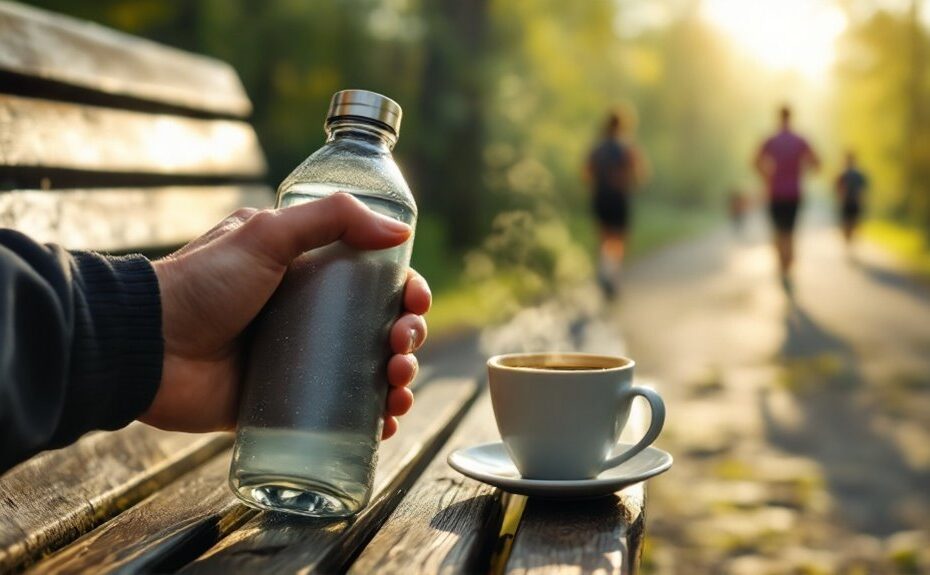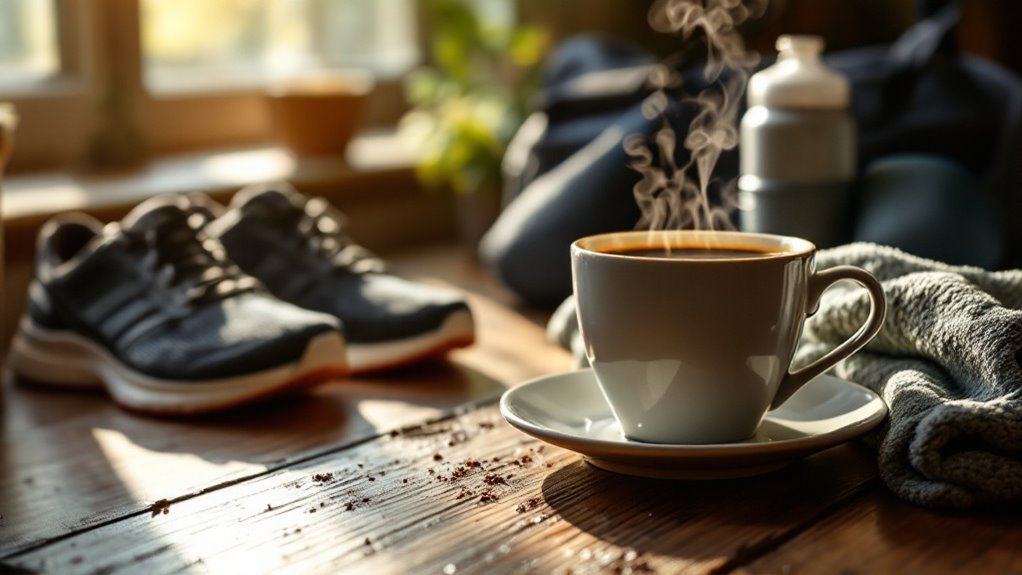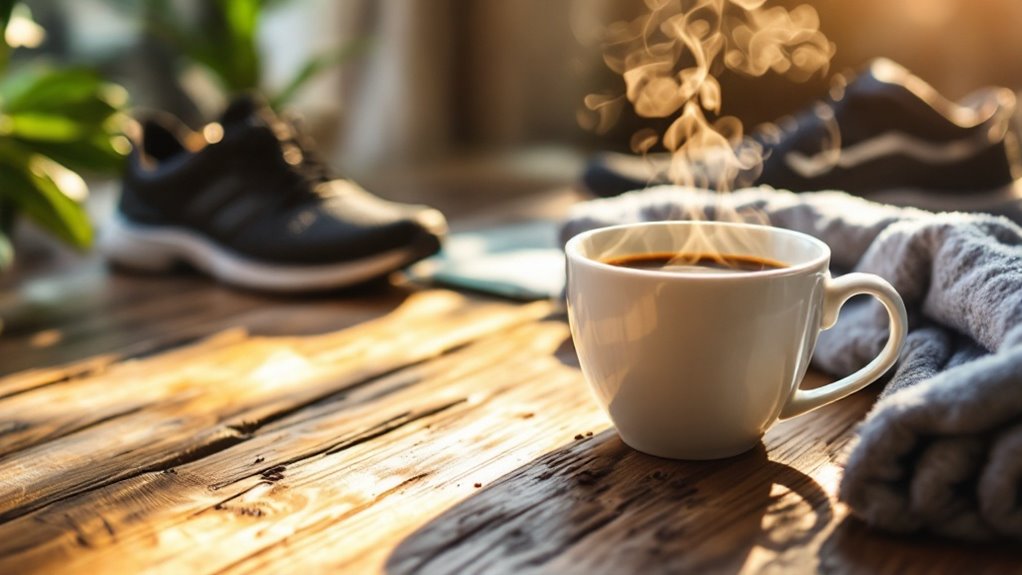



Coffee, often blamed for dehydration, might just be your hydration ally during exercise. You've likely heard caffeine is a diuretic, but when you're active, its effects aren't as straightforward. Studies suggest moderate coffee intake hydrates you almost as effectively as water, with 98% of its fluid absorbed. Yet, the story changes if you overdo it—excessive caffeine can tip the scales toward dehydration, especially in extreme conditions. So, how do you strike the balance between fueling your workout and staying hydrated? The answer lies in understanding how your body processes caffeine when you're on the move.
Key Takeaways
- Moderate coffee intake (3-6 mg/kg caffeine) doesn't dehydrate during exercise due to minimal diuretic effects and fluid retention for performance.
- Coffee hydrates similarly to water, with 98% of its fluid absorbed and utilized by the body during physical activity.
- Caffeine in coffee enhances endurance performance by reducing perceived exertion and increasing fat oxidation, especially in aerobic activities over 20 minutes.
- Regular coffee drinkers develop tolerance, reducing caffeine's diuretic effects and maintaining stable hydration markers during exercise.
- Excessive caffeine (>500 mg daily) increases dehydration risk, especially during intense or prolonged exercise in hot conditions.
Caffeine's Diuretic Effect on Hydration
While caffeine is known to have a diuretic effect, increasing urine production temporarily, moderate intake (3-6 mg/kg body weight) doesn't substantially dehydrate you during exercise. Studies show caffeine's diuretic impact is minimal during physical activity because your body conserves water to support exercise performance. If you're a regular caffeine user, you'll likely develop tolerance to its diuretic effects, further reducing fluid loss compared to occasional consumers. Combining caffeine with adequate water intake helps maintain hydration, as fluids from caffeinated beverages still contribute to your daily hydration needs. A 2003 review confirmed that moderate caffeine consumption doesn't lead to dehydration during exercise, even in athletes. So, as long as you stay within recommended limits and hydrate properly, caffeine won't markedly disrupt your hydration during workouts.
Impact of Coffee on Exercise Performance
Caffeine in coffee can markedly enhance your exercise performance, particularly during endurance activities like running or cycling. Consuming 1-2 cups of coffee (3-6 mg/kg of caffeine) 30-60 minutes before exercise can improve performance by 2-16%. This boost comes from reduced perceived exertion and increased fat oxidation, helping you sustain effort longer. Coffee's ergogenic effects are most effective in aerobic activities lasting over 20 minutes. However, regular caffeine consumption may lead to tolerance, requiring higher doses for the same benefits. While coffee can improve exercise performance, it's important to monitor your hydration status, as dehydration can offset these gains. For ideal results, time your caffeine intake strategically and adjust based on your tolerance and activity type.
Physiological Mechanisms During Exercise
During exercise, your body activates several physiological mechanisms to maintain hydration and optimize performance. Intense physical activity triggers the release of antidiuretic hormone (ADH), which reduces urine production to conserve water. Blood flow is redirected from your kidneys to working muscles, minimizing fluid loss through urination. Sweating and thermoregulation also prioritize water retention, helping counteract caffeine's mild diuretic effect. Research shows that caffeine's impact on urine production is blunted during exercise due to these natural water conservation processes. As a result, consuming coffee before or during exercise doesn't markedly disrupt fluid balance or lead to excessive fluid loss. Your body's ability to adapt guarantees hydration remains stable, allowing you to focus on performance without worrying about dehydration from caffeine.
Individual Factors Influencing Hydration
Because individual responses to caffeine and hydration vary, understanding personal factors is key to optimizing fluid balance during exercise. Your caffeine intake affects fluid balance differently based on factors like genetics, tolerance, and hormonal changes. Women may experience stronger diuretic effects from caffeine due to menstrual cycles or pregnancy. If you're a regular caffeine consumer, you'll likely develop tolerance, reducing its diuretic impact compared to occasional users. However, high doses (>500 mg) can increase dehydration risk, especially during intense exercise or in hot, humid conditions. Your genetic makeup also plays a role, as some people metabolize caffeine faster, altering its effects on hydration. Tailoring your caffeine intake to your body's response helps maintain fluid balance and minimizes dehydration risks during exercise.
Safe Caffeine Intake Guidelines for Athletes
To optimize performance, aim for 3-6 mg of caffeine per kilogram of body weight, staying below 400 mg daily to avoid side effects. Pair caffeine with water or electrolyte drinks to maintain hydration and counter its mild diuretic effect. Test your tolerance during training to determine the ideal dose for competition without risking dehydration or discomfort.
Daily Caffeine Limits
While caffeine can enhance athletic performance, it's important to stay within safe daily limits to avoid negative effects. The FDA recommends a daily caffeine limit of 400 mg for healthy adults, roughly equivalent to 4-5 cups of coffee. For athletes, aim for 3-6 mg of caffeine per kilogram of body weight to optimize performance without exceeding safe levels. Keep your total caffeine intake below 500 mg daily, as higher amounts may increase dehydration risk during intense exercise. Tailor your caffeine intake based on body weight, tolerance, and exercise intensity to prevent adverse effects like increased heart rate or impaired performance. Exceeding 10 mg/kg daily can lead to dehydration and other health concerns, so monitor your consumption carefully.
Hydration Balance Tips
When combining caffeine with exercise, maintaining hydration balance is essential for peak performance and safety. To support fluid balance: a review suggests pairing caffeine with adequate water intake, especially during moderate daily activity. Aim for 3-6 mg of caffeine per kg of body weight, and avoid exceeding 400 mg daily to minimize dehydration risks. Regular caffeine users often develop tolerance to its diuretic effects, helping maintain fluid balance during workouts. Monitor hydration by checking urine color and responding to thirst cues, particularly in hot or humid conditions. Choose fluid thats hydrating, like water or electrolyte drinks, alongside caffeinated beverages. By balancing caffeine intake with proper hydration, you can optimize fluid balance and reduce the risk of dehydration during exercise.
Performance Optimization Strategies
Athletes can enhance performance by adhering to safe caffeine intake guidelines, which recommend consuming 3-6 mg of caffeine per kilogram of body weight. For most individuals, this translates to 200-400 mg of caffeine, taken 30-60 minutes before exercise, to boost endurance and reduce perceived exertion. Regular caffeine users develop tolerance to its diuretic effects, minimizing hydration concerns during exercise. To maintain hydration, pair caffeine with adequate water intake, especially during prolonged or intense activity. Avoid exceeding 500 mg of caffeine, as higher doses may increase dehydration risk, particularly in hot or humid conditions. By optimizing caffeine intake and prioritizing hydration, you can maximize exercise performance while minimizing potential side effects. Stick to these evidence-based strategies for safe and effective performance optimization.
Coffee vs. Water for Hydration
You might wonder if coffee dehydrates you during exercise, but research shows its diuretic effect is minimal, especially if you consume less than 240 mg of caffeine daily. Studies confirm that coffee hydrates similarly to water, as the fluid it provides offsets any mild diuretic impact, particularly for regular drinkers. While water remains the best choice for intense workouts, coffee can still support hydration without compromising performance.
Caffeine's Diuretic Impact
While caffeine is often associated with dehydration, moderate coffee consumption hydrates similarly to water due to the fluid content offsetting its mild diuretic effect. Caffeine's diuretic properties can increase urine output, but this effect is minimal, especially if you're a regular coffee drinker. Studies show that habitual consumers develop tolerance, reducing caffeine's impact on hydration. For example, a 2014 study found no significant difference in hydration markers between those who drank coffee or water over 24 hours. During exercise, caffeine's diuretic effect is further blunted as your body prioritizes water conservation. This means coffee can effectively contribute to your daily fluid intake without compromising hydration. In moderation, coffee hydrates just as well as water, making it a viable option for maintaining fluid balance.
Hydration Balance Comparison
When comparing hydration balance between coffee and water, research shows that moderate coffee consumption hydrates just as effectively as water. Studies indicate that 3-6 cups of coffee daily maintain hydration levels similar to water, as caffeine's diuretic effect is minimal in regular drinkers. Coffee contributes to your daily fluid intake, with 98% of its fluid absorbed and utilized by your body. Hydration markers, like urine specific gravity and body weight changes, remain stable when you drink coffee in moderation. Even during exercise, caffeine doses below 300 mg (about 3 cups) don't negatively impact hydration status. While coffee may slightly increase urine production, it doesn't lead to dehydration when consumed in reasonable amounts. For hydration, coffee can be a practical alternative to water.
Exercise Performance Effects
Although coffee is often debated for its hydration effects during exercise, research shows it performs similarly to water in maintaining fluid balance and supporting performance. When it comes to exercise performance effects, caffeine can boost endurance and reduce perceived exertion, making it a practical choice for athletes. Studies confirm that moderate coffee intake (3-6 mg/kg body weight) doesn't impair human performance and may even enhance it. During exercise, caffeine's diuretic effect is minimized, so you're less likely to lose fluids compared to resting conditions. For example, a 2016 study found no difference in hydration or performance between coffee and water during cycling. Whether you choose coffee or water, both support hydration and exercise performance equally, so you can confidently fuel your workouts with either option.
Risks of Excessive Caffeine Consumption
Excessive caffeine consumption, particularly during exercise, can pose considerable risks to your hydration and overall health. Caffeine increases the production of urine, which can lead to dehydration, especially if you consume more than 500 mg daily. While moderate daily caffeine intake (around 200-300 mg) is generally safe, excessive caffeine intake—over 10 mg/kg of body weight—can substantially raise dehydration risk, particularly during physical activity. Non-habitual users are more vulnerable to these effects due to lower tolerance. High doses may also cause symptoms like irregular heartbeat, chest pain, or heat intolerance, impairing exercise performance and safety. Combining excessive caffeine with intense workouts in hot or humid conditions further heightens dehydration risk, potentially leading to serious health complications. Always monitor your intake to avoid these risks.
Practical Hydration Tips for Active Individuals
To stay hydrated during exercise, pair your coffee with water, as caffeine's diuretic effect is mild and can be balanced by adequate fluid intake. Limit coffee consumption to 3-6 mg of caffeine per kilogram of body weight before exercise to enhance performance without risking dehydration. Monitor your hydration by checking urine color—light yellow indicates proper hydration—and paying attention to thirst cues. Avoid excessive caffeine doses (over 500 mg) during intense or prolonged exercise to minimize fluid loss risks. If you're a regular coffee drinker, your body adapts, reducing caffeine's diuretic effects, making moderate coffee consumption safe for hydration during exercise. Prioritize consistent fluid intake throughout the day, especially when combining coffee and physical activity.
Disclosure: As an Amazon Associate, I earn from qualifying purchases.






